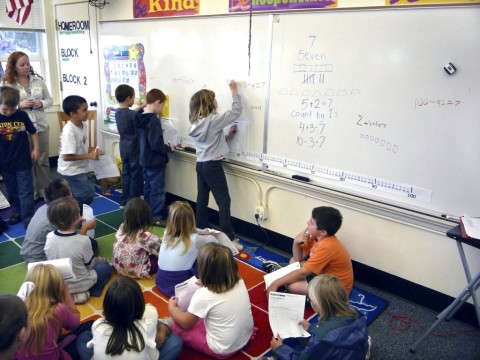Developing Your Child’s Scientific Understanding
 Washington, D.C. – Children can be introduced gradually to basic scientific concepts that will provide a framework for understanding and connecting many scientific facts and observations.
Washington, D.C. – Children can be introduced gradually to basic scientific concepts that will provide a framework for understanding and connecting many scientific facts and observations.
Here will focus on five concepts and processes taken from the National Science Education Standards, released in 1996 by the National Resource Council of the National Academy of Sciences.[ 2 ]
You can easily introduce your child to the following five concepts through many simple science-related activities that you and your child can do at home or in the community.

Tips for Learning Science
- Systems, Order and Organization
The natural world is so large and complicated that scientists break it down into smaller parts in order to study it in depth. These smaller units are called systems. Scientists look for patterns through which they can classify—or organize—things into systems. For instance, animals that have fur or hair are classified as mammals. When you encourage your child to gather and organize objects according to their size or color—for example, leaves or insects—you are helping prepare her to think in terms of systems. Furthermore, scientists believe that nature is understandable and predictable—that there is an order to it. For instance, low barometric pressure is often followed by storms. Challenging your child to make reasonable predictions such as this will further prepare her to look at the world in a scientific way. - Evidence,Models and Explanations
Scientists test the explanations they come up with, and the results of their tests are evidence on which to base their explanations. Sometimes they call their explanations “theories” or “models” or “hypotheses”. Children can test their theories about the world too: Is it the baking soda that makes my pancakes thick? Can I make thicker pancakes with more soda? - Change, Constancy and Measurement
The natural world changes continually. Some objects change rapidly and some at a rate too slow for us to observe. You can encourage your child to look for changes by asking him to observe and talk about:- What happens to breakfast cereal when we pour milk on it?
- What happens over time when a plant isn’t watered or exposed to proper sunlight?
- What changes can be reversed? Once water is turned into ice cubes, can it be turned back into water? Yes. But if an apple is cut into slices, can the slices be changed back into the whole apple?
Children can observe change more carefully through measurement. Keeping a growth chart or making a graph of the temperature each day will give your child practice looking for differences and measuring them—and help him to understand how he’ll need to use math skills in learning science.
- Evolution and Equilibrium
It’s hard for children to understand evolution (how things change over time) and equilibrium (how things attain a steady and balanced state of being). During these early years, you can, however, talk about how things change over time and point them out to your child. For instance, show your child a series of photos of himself from birth to the present and talk about the many ways he’s changed. And, you can talk about balance and the work it often takes to achieve it: Learning to ride a bicycle or walk with a book on his head are good examples. - Form and Function
One of the simplest themes in science is all around: The shape of a natural thing is almost always related to its function. Begin with man-made objects. Can your child guess the use of a thimble, a corkscrew, a phonograph record? When you are looking at animals, ask him questions such as: “What might those plates do on the stegosauros’s back?” “What sort of habitat would a web-footed platypus like?” His best guess will almost always be correct.


